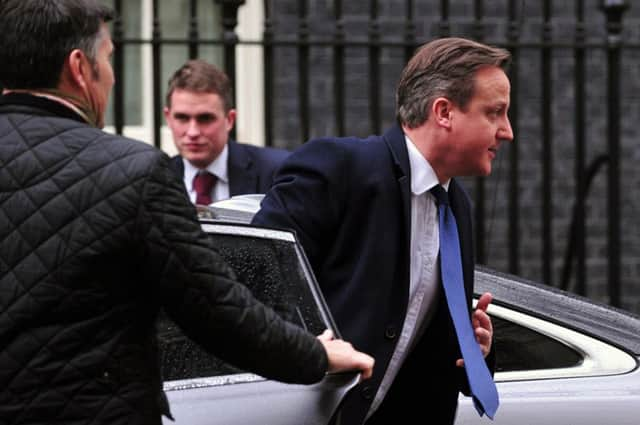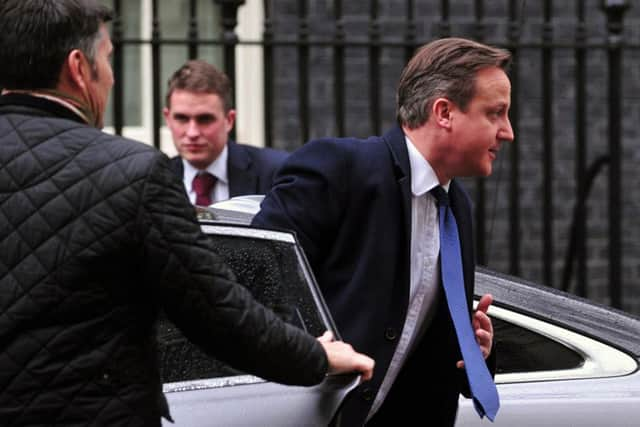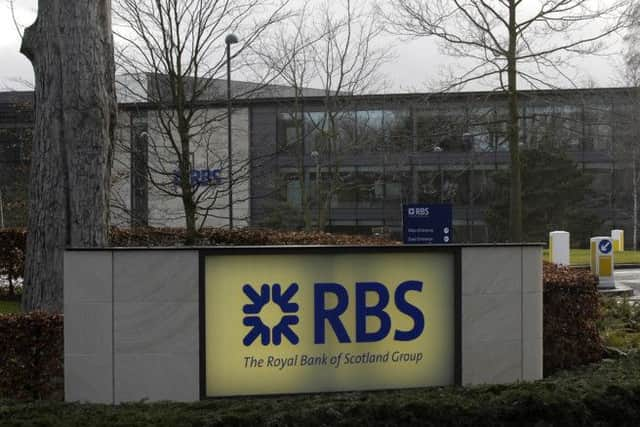David Cameron ducks call to cap bonuses at RBS


The Prime Minister’s efforts to reassure the public that his government was tackling the culture of greed in the financial sector stopped short of a full pledge to block huge financial rewards and were described by his opponents as “a complete red herring”.
Faced with anger over the prospect of some RBS bankers receiving enormous bonuses on top of their already lucrative salaries, the Prime Minister said his government would “veto” any increase in the overall level of pay and bonuses handed out by the taxpayer-owned bank.
Advertisement
Hide AdAdvertisement
Hide AdPressed on the issue at Prime Minister’s Questions, Mr Cameron also insisted that cash bonuses at Royal Bank of Scotland would be limited to £2,000.


But his assurances did not answer Labour leader Ed Miliband’s question on whether he would cap individual RBS bankers’ bonuses or non-cash bonuses that come in the form of shares.
Mr Cameron’s critics pointed out that the Prime Minister’s promise to limit the overall bonus bill was not the same as capping individual bonuses, the highest of which would have to be approved by the government as RBS’s main shareholder.
Given that RBS has been shedding staff across the group, Mr Cameron’s critics highlighted that the 81 per cent state-backed bank could still pay 200 per cent bonuses to a number of investment bankers earning £1 million a year without increasing its overall pay and bonus bill.
Mr Cameron said: “We will continue with our plans for RBS that have seen bonuses come down by 85 per cent, that has seen the bonus pool at one third of the level that it was under Labour.


“I can confirm today that just as we have had limits on cash bonuses of £2,000 at RBS this year and last year, we will do the same next year.”
He added: “If there are any proposals to increase the overall pay, that is pay and bonus bill, at RBS, any proposals for that, we will veto it.”
Mr Cameron’s performance at the dispatch box was criticised afterwards in a Labour-led debate in the Commons, which called on the government not to increase a bonus cap being introduced by the European Union next year. In most cases, banks will be forbidden from paying a bonus of more than 100 per cent of an employee’s salary under the 2015 EU rules.
Advertisement
Hide AdAdvertisement
Hide AdThere will be provision for exceptions, with high-performing bankers receiving a bonus of up to 200 per cent of salary if approved by shareholders.
Like most City banks, RBS is expected to invoke the clause in the EU law regarding the approval of shareholders – which in its case means the taxpayer through the UK government.
The government is challenging the cap in the courts, and Chancellor George Osborne yesterday warned it would not lead to bankers receiving less money, as financial institutions would simply respond by paying higher basic salaries.
This, he argued, would create a “Fred Goodwin-style situation” in that it would become more difficult to claw back cash if things went wrong.
The Chancellor’s position was backed yesterday by the Governor of the Bank of England, Mark Carney, who told the Treasury select committee yesterday that he did not support a “crude bonus cap”.
Some have also argued that a cap on bonuses would lead to a brain-drain of Britain’s best banking talent to posts in financial centres such as New York and Singapore.
Shadow chief secretary to the Treasury Chris Leslie called Mr Cameron’s promise of a veto a “complete red herring”.
Mr Leslie suggested it was ploy to dodge the question of how the government would act when under EU law it represents British taxpayers in deciding whether to approve bonuses above 100 per cent at RBS.
Advertisement
Hide AdAdvertisement
Hide AdMr Leslie told the Commons: “For all the sophistry and the smoke-and-mirrors attempts by ministers to try and give the impression that they were taking action on bonuses, we know that they confront a key decision because of this new Europe-wide rule to limit bonuses.
“The Prime Minister gave the impression that he was going to veto higher pay and bonuses.
“But some of us may well think that he was conveniently looking at this question of total banker pay at RBS, total remuneration, as a sort of device to slip out of this question about how he’s going to exercise that shareholder vote.
“The House needs to know that RBS has been reducing the number of bankers on their roll by about 2,000 in the last year. You’d expect their total pay bill to start to fall; so it should.
“But it still doesn’t get out of the question about those individual senior bankers, those earning £400,000 or more, whether the shareholder, in this case the Chancellor, is going to give them permission not just to have bonuses of 100 per cent of their salary, but to bust through that and go to 200 per cent of their salary. That is a crucial test for the Chancellor.”
Turning to the government’s front bench, Mr Leslie added: “Most of the people watching this debate would think ‘well it would be nice to get any bonus’. Twice the amount of pay – totally unacceptable. The Chancellor and you are going to have to confront the anger of the public on this particular issue.”
Labour’s motion was defeated by 304 votes to 242.
On the bonus issue, a RBS spokesman said: “No decisions have been taken yet. We’re consulting with our shareholders in the normal way.”
Carney does not back a ‘crude’ cap
Bank of England Governor Mark Carney said he does not back a “crude bonus cap” on pay in banks or proposals to restrict their size.
Advertisement
Hide AdAdvertisement
Hide AdHis remarks to MPs on the Treasury select committee are likely to be seen as a rejection of Labour rhetoric on the financial sector. Mr Carney said he “absolutely” agreed with the conclusions of the parliamentary commission on banking standards that it was not convinced a cap was the right way to control pay.
He said the EU cap “takes back some of the advantages of the approach we have had, because it will incentivise more cash compensation today – exactly the type of problem we had before – that we can’t claw back”.
The Governor also backed a separate commission led by Sir John Vickers that a cap on banks’ market share would “not result in substantial improvement to competition”.
Mr Carney said: “Just breaking up an institution doesn’t necessarily create or enable a more intensive competitive structure.”
An EU bonus cap would mean pay-outs of more than 100 per cent of basic salary must be approved by shareholders – but this is being challenged by the government in the courts.
SEE ALSO